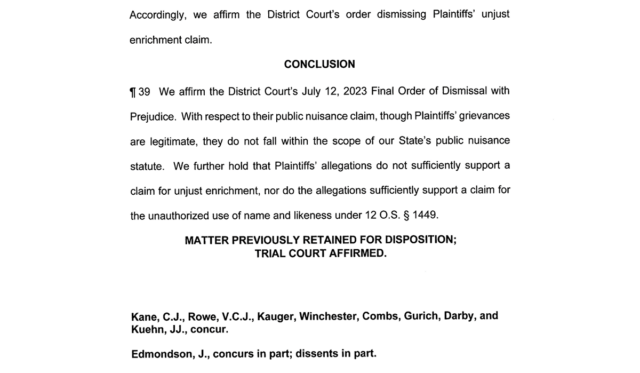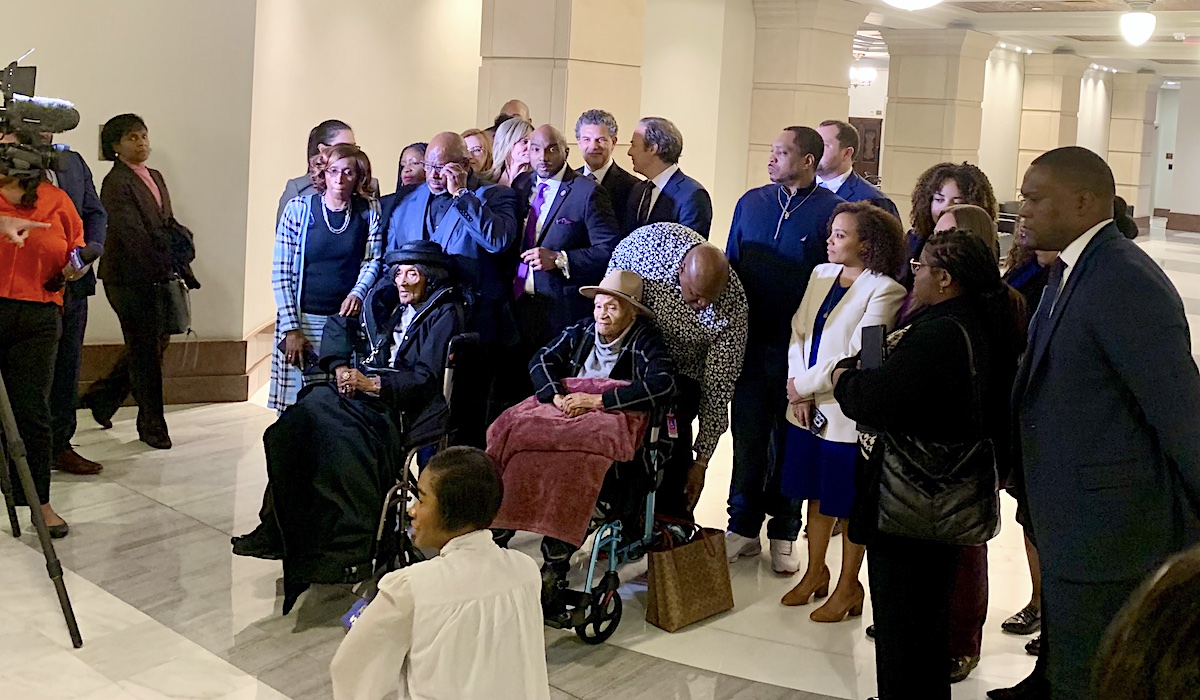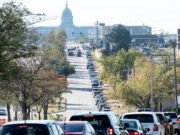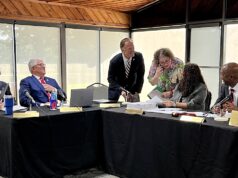

The City of Tulsa, Tulsa Regional Chamber, Tulsa County Board of Commissioners, Tulsa County Sheriff and Oklahoma Military Department are not liable for creating a public nuisance or unjust enrichment stemming from the 1921 Tulsa Race Massacre and its aftermath, the Oklahoma Supreme Court ruled today.
“We hold that relief is not possible under any set of facts that could be established consistent with plaintiff’s allegations,” Vice Chief Justice Dustin Rowe wrote.
In an 8-1 decision, justices upheld Tulsa County District Court Judge Caroline Wall’s dismissal of a lawsuit brought by survivors of the Tulsa Race Massacre. Rowe wrote the court’s opinion (embedded below), with every justice concurring except Justice James Edmondson who partially concurred and partially dissented.
While the decision is available on the Oklahoma State Court Network case page, Edmondson’s partial concurrence and dissent is missing. Jari Askins, chief administrator of the courts, said neither Edmondson nor any other justice wrote a separate opinion in the case.
Wednesday’s ruling comes 10 weeks after the Oklahoma Supreme Court held oral arguments with the parties April 2. On Tuesday, the court released seven other rulings, including one affirming local control of school district libraries.
Decision follows similar analysis in opioid verdict vacation

Filed in Tulsa County District Court in 2020 on behalf of three surviving community members who lived through the 1921 Tulsa Race Massacre, the lawsuit alleged that defendants created an ongoing public nuisance through their actions during and after the massacre, which razed the affluent Black area of Tulsa known as Greenwood and spurred a series of subsequent policies and development decisions that disenfranchised and deprived families of economic opportunities in a manner still reflected by the under-resourced neighborhoods of north Tulsa.
In his opinion, Rowe said expanding Oklahoma’s public nuisance liability to cover “historical tragedies and injustices” would expand public nuisance liability beyond what the Oklahoma Legislature intended. A similar statement was articulated in the 2021 Oklahoma Supreme Court decision invalidating a $465 million district court verdict in the state’s public nuisance litigation against Johnson & Johnson regarding opioid abuse, a ruling that occurred during the district court stage of the Tulsa Race Massacre litigation.
“Expanding public nuisance liability to include lingering social inequities from historical tragedies and injustices runs the risk of creating a new ‘unlimited and unprincipled’ form of liability wherein both state and non-state actors could be held liable for their predecessors’ wrongdoing, in which current actors played no part,” Rowe wrote.
The “unlimited and unprincipled” phrase also appeared in the Supreme Court’s opioid opinion.
“Accepting as true that the massacre is a continuing blight within all property in the Greenwood community — and that the pall of the massacre continues to envelop the Greenwood community over 100 years later — plaintiffs’ claim does not present a conflict resolvable by way of abatement,” Rowe wrote. “And even accepting as true plaintiffs’ claim that the lingering economic and social consequences of the massacre still, to some extent, endanger the comfort and repose of the Greenwood and north Tulsa communities, those lingering consequences over 100 years later, standing alone, do not constitute a public nuisance, as that term has been construed by this court. The continuing blight alleged within the Greenwood community born out of the massacre implicates generational-societal inequities that can only be resolved by policymakers — not the courts.”
Rowe said that the plaintiffs’ “grievance with the social and economic inequalities created by the Tulsa Race Massacre is legitimate and worthy of merit.”
“However, the law does not permit us to extend the scope of our public nuisance doctrine beyond what the Legislature has authorized to afford plaintiffs the justice they are seeking,” he wrote.
The court was similarly unpersuaded by the unjust enrichment claim, which argued that the increased focus on Black Wall Street as a historical site and tourism draw allowed the defendants, like the City of Tulsa, to profit unjustly off of the massacre that the government institutions helped perpetrate a century prior.
“Though we take as true that plaintiffs’ pain and trauma has been exacerbated by the promotion of the massacre for fundraising purposes, our jurisprudence does not allow the transfer of funds donated by third parties as a remedy for unjust enrichment absent an allegation of fraud, abuse of confidence, and or unconscionable conduct,” Rowe wrote.
Damario Solomon-Simmons, the lead attorney representing plaintiffs Lessie Benningfield Randle and Viola Ford Fletcher, did not respond to a request for comment about the court’s ruling prior to the publication of this article. A third plaintiff, Hughes Van Ellis, died in 2023 at age 102.
During the April 2 oral arguments, Solomon-Simmons said no one has ever been held accountable for the tragedy that fundamentally derailed the economic opportunities of many Black Tulsans for generations.
“You have defendants who have never ever been held legally responsible for the massacre, and to this very day these defendants deny they perpetrated the massacre,” Solomon-Simmons said. “They deny that they created a public nuisance, they deny that they have any legal responsibility to clean up the public nuisance — the blighted neighborhood of Greenwood — that they created. They’ve escaped liability for 103 years.”
Rep. Jason Lowe (D-OKC) released a statement Wednesday afternoon regarding the court’s decision.
“I’m greatly disappointed with the Oklahoma Supreme Court’s dismissal of the case regarding the survivors of the Tulsa Race Massacre of 1921,” Lowe said. “Viola Fletcher, Lessie Evelyn Benningfield Randle, and the family of the departed Hughes Van Ellis will never be able to receive their due justice in the state of Oklahoma.”
(Update: This article was updated at 4:25 p.m. Wednesday, June 12, to include additional information.)
Read the opinion dismissing the Tulsa Race Massacre lawsuit
